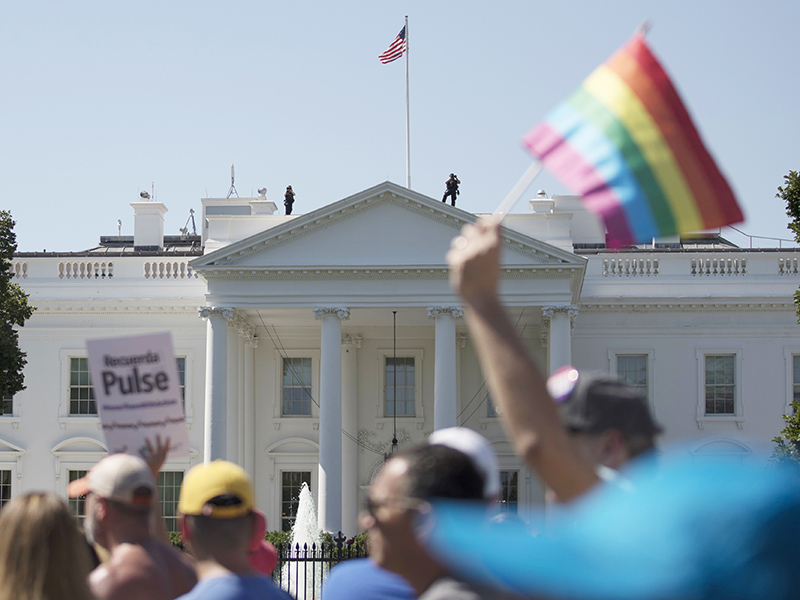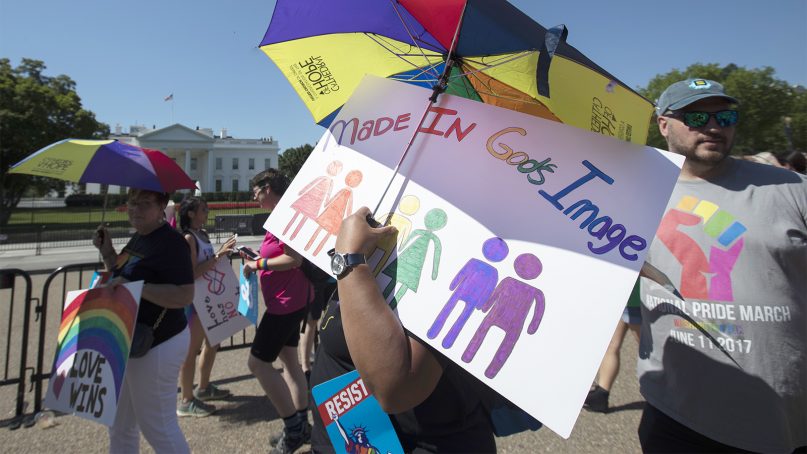(RNS) — Last week, President Trump’s Department of Labor put out a proposal to “clarify” existing religious exemptions from a 50-year-old federal mandate that government contractors not discriminate in who they hire. The exemptions were widely seen as an effort to make it easier for contractors to discriminate against LGBTQ-identified people — even though the proposed regulation change says nothing about them.
There’s good reason to think so, but you’ll have to bear with me to understand why.
The proposed regulation would alter Executive Order 11246, which was issued by President Lyndon Johnson in 1965 to enforce Title VII of the 1964 Civil Rights Act to make sure that the legislation would be applied especially stringently to federal contractors. Like the provisions in Title VII, Johnson’s order bars employment discrimination on the grounds of “race, color, religion, sex, or national origin.”
Several of Johnson’s successors have amended the order to detail procedures and bring it into line with court decisions. In making its proposal, the Labor Department noted, “Finally, in 2002, President George W. Bush amended the executive order by expressly importing Title VII’s exemption for religious organizations,” changing Section 204c to permit religious contractors, including educational institutions, to hire members of their own faith.
But that “finally” is deceptive. What the proposal fails to mention is that in 2014, President Obama amended it once more to prohibit discrimination based on “sexual orientation” and “gender identity.” And there’s the rub.
This fall, the Supreme Court will hear arguments in several cases addressing the question of whether Title VII’s prohibition of discrimination based on sex extends to discrimination based on sexual orientation. The Trump Justice Department has weighed in that it doesn’t.

Equality March for Unity and Pride participants march past the White House in Washington on June 11, 2017. Many LGBT-rights activists never believed Donald Trump’s campaign promises to be their friend. With his move to ban transgender people from military service on July 26, 2017, on top of other actions and appointments, many now see him as openly hostile. (AP Photo/Carolyn Kaster)
Should the Court agree — and given the current line-up of justices, you shouldn’t bet against it — federal contractors who wish to discriminate against LGBTQ persons will get an exemption to do so if they can argue that LGBTQ behavior violates their religious beliefs.
Last week’s proposal will serve to substantially lower the bar for qualifying for that exemption.
An organization’s right to discriminate need only be based on a sincere religious belief. Such a belief can be used to require employees to adhere to the organization’s religious tenets regardless of whether they share the organization’s faith or not.
Let’s say, for example, that two non-Catholic women who teach at the University of Notre Dame get married. Under the proposed rule, the school would be able to fire them without putting its federal research contracts at risk.
But the organization does not have to be primarily involved in promoting a religious purpose. Nor does it have to be a not-for-profit entity. The religious exemption is available so long as the organization possesses “a self-identified religious purpose,” holds itself out to the public “as carrying out” such a purpose, and exercises religion “consistent with, and in furtherance of, a religious purpose.”
Imagine, for instance, a highway foliage-trimming company that, like Chick-fil-A, says it exists “(t)o glorify God by being a faithful steward of all that is entrusted to us,” and which doesn’t work on Sundays.
Now it’s important to bear in mind that the Department of Labor’s proposal is not claiming that any organization with a self-identified religious purpose, etc., is entitled to an exemption. In its own words, “religious employers can condition employment on acceptance of or adherence to religious tenets without sanction by the federal government, provided that they do not discriminate based on other protected bases.”
Thus, for example, even if you have a sincere religious belief that the races must not intermingle, you don’t get to discriminate against a mixed-race couple, since race is a protected basis under Title VII.
So here’s a question for the folks at Labor. Let’s suppose the two Notre Dame professors in the above example attend Pete Buttigieg’s Episcopal church in South Bend, and in line with that church’s tenets, believe their marriage to be sanctified by God. Their belief is sincere, their nuptials undertaken as a religious exercise.
Under Labor’s proposal, does Notre Dame get to fire them because Title VII does not extend to sexual orientation? Or, regardless of whether Title VII extends to sexual orientation, does their religious exercise in getting married represent a “protected basis” under Title VII and prevent their being fired?
What is at stake is whose free exercise is more important: a Catholic university that hires mostly irrespective of faith and whose main business is secular education? Or the church-going employees for whom marriage is a sacrament?”






